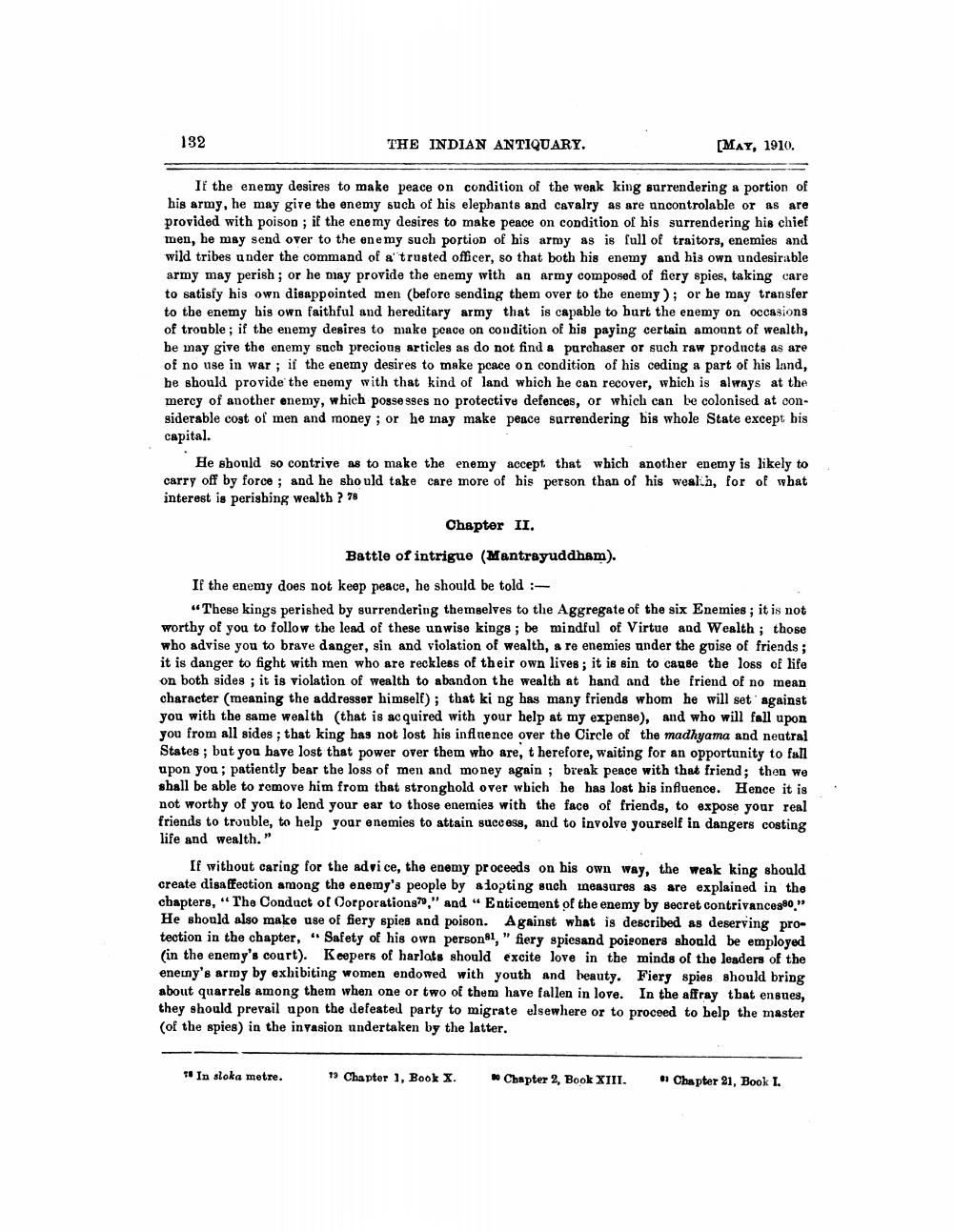________________
132
THE INDIAN ANTIQUARY.
If the enemy desires to make peace on condition of the weak king surrendering a portion of his army, he may give the enemy such of his elephants and cavalry as are uncontrolable or as are provided with poison; if the enemy desires to make peace on condition of his surrendering his chief men, he may send over to the enemy such portion of his army as is full of traitors, enemies and wild tribes under the command of a trusted officer, so that both his enemy and his own undesirable army may perish; or he may provide the enemy with an army composed of fiery spies, taking care to satisfy his own disappointed men (before sending them over to the enemy); or he may transfer to the enemy his own faithful and hereditary army that is capable to hurt the enemy on occasions of trouble; if the enemy desires to make peace on condition of his paying certain amount of wealth, he may give the enemy such precious articles as do not find a purchaser or such raw products as are of no use in war; if the enemy desires to make peace on condition of his ceding a part of his land, he should provide the enemy with that kind of land which he can recover, which is always at the mercy of another enemy, which possesses no protective defences, or which can be colonised at considerable cost of men and money; or he may make peace surrendering his whole State except his capital.
He should so contrive as to make the enemy accept that which another enemy is likely to carry off by force; and he should take care more of his person than of his wealth, for of what interest is perishing wealth? 78
Chapter II.
Battle of intrigue (Mantrayuddham).
[MAY, 1910.
If the enemy does not keep peace, he should be told :
"These kings perished by surrendering themselves to the Aggregate of the six Enemies; it is not worthy of you to follow the lead of these unwise kings; be mindful of Virtue and Wealth; those who advise you to brave danger, sin and violation of wealth, a re enemies under the guise of friends; it is danger to fight with men who are reckless of their own lives; it is sin to cause the loss of life on both sides; it is violation of wealth to abandon the wealth at hand and the friend of no mean character (meaning the addresser himself); that ki ng has many friends whom he will set against you with the same wealth (that is acquired with your help at my expense), and who will fall upon you from all sides; that king has not lost his influence over the Circle of the madhyama and neutral States; but you have lost that power over them who are, therefore, waiting for an opportunity to fall upon you; patiently bear the loss of men and money again; break peace with that friend; then we shall be able to remove him from that stronghold over which he has lost his influence. Hence it is not worthy of you to lend your ear to those enemies with the face of friends, to expose your real friends to trouble, to help your enemies to attain success, and to involve yourself in dangers costing life and wealth."
In sloka metre.
If without caring for the advice, the enemy proceeds on his own way, the weak king should create disaffection among the enemy's people by adopting such measures as are explained in the chapters, "The Conduct of Corporations70," and "Enticement of the enemy by secret contrivances80" He should also make use of fiery spies and poison. Against what is described as deserving protection in the chapter, "Safety of his own person81," fiery spiesand poisoners should be employed (in the enemy's court). Keepers of harlots should excite love in the minds of the leaders of the enemy's army by exhibiting women endowed with youth and beauty. Fiery spies should bring about quarrels among them when one or two of them have fallen in love. In the affray that ensues, they should prevail upon the defeated party to migrate elsewhere or to proceed to help the master (of the spies) in the invasion undertaken by the latter.
13 Chapter 1, Book X.
30 Chapter 2, Book XIII.
Chapter 21, Book I.




